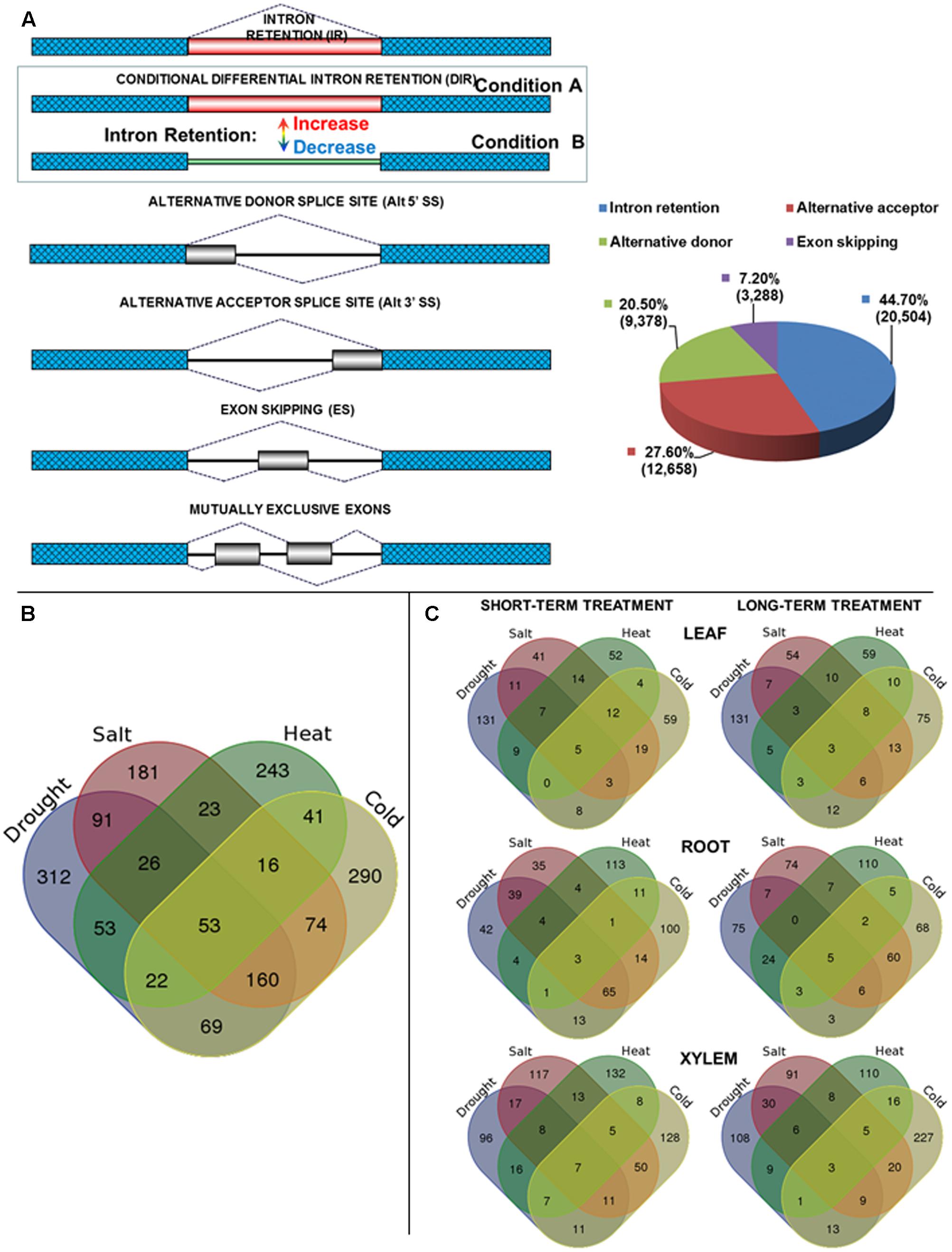| Abstract |
Abiotic stresses affect plant physiology, development, growth, and alter pre-mRNA splicing. Western poplar is a model woody tree and a potential bioenergy feedstock. To investigate the extent of stress-regulated alternative splicing (AS), we conducted an in-depth survey of leaf, root, and stem xylem transcriptomes  under drought, salt, or temperature stress. Analysis of approximately one billion of genome-aligned RNA-Seq reads from tissue- or stress-specific libraries revealed over fifteen millions of novel splice junctions. Transcript models supported by both RNA-Seq and single molecule isoform sequencing (Iso-Seq) data revealed a broad array of novel stress- and/or tissue-specific isoforms. Analysis of Iso-Seq data also resulted in the discovery of 15,087 novel transcribed regions of which 164 show AS. Our findings demonstrate that abiotic stresses profoundly perturb transcript isoform profiles and trigger widespread intron retention (IR) events. Stress treatments often increased or decreased retention of specific introns - a phenomenon described here as differential intron retention (DIR). Many differentially retained introns were regulated in a stress- and/or tissue-specific manner. A subset of transcripts harboring super stress-responsive DIR events showed persisting fluctuations in the degree of IR across all treatments and tissue types. To investigate coordinated dynamics of intron-containing transcripts in the study we quantified absolute copy number of isoforms of two conserved transcription factors (TFs) using Droplet Digital PCR. This case study suggests that stress treatments can be associated with coordinated switches in relative ratios between fully spliced and intron-retaining isoforms and may play a role in adjusting transcriptome to abiotic stresses. under drought, salt, or temperature stress. Analysis of approximately one billion of genome-aligned RNA-Seq reads from tissue- or stress-specific libraries revealed over fifteen millions of novel splice junctions. Transcript models supported by both RNA-Seq and single molecule isoform sequencing (Iso-Seq) data revealed a broad array of novel stress- and/or tissue-specific isoforms. Analysis of Iso-Seq data also resulted in the discovery of 15,087 novel transcribed regions of which 164 show AS. Our findings demonstrate that abiotic stresses profoundly perturb transcript isoform profiles and trigger widespread intron retention (IR) events. Stress treatments often increased or decreased retention of specific introns - a phenomenon described here as differential intron retention (DIR). Many differentially retained introns were regulated in a stress- and/or tissue-specific manner. A subset of transcripts harboring super stress-responsive DIR events showed persisting fluctuations in the degree of IR across all treatments and tissue types. To investigate coordinated dynamics of intron-containing transcripts in the study we quantified absolute copy number of isoforms of two conserved transcription factors (TFs) using Droplet Digital PCR. This case study suggests that stress treatments can be associated with coordinated switches in relative ratios between fully spliced and intron-retaining isoforms and may play a role in adjusting transcriptome to abiotic stresses. |

 under drought, salt, or temperature stress. Analysis of approximately one billion of genome-aligned RNA-Seq reads from tissue- or stress-specific libraries revealed over fifteen millions of novel splice junctions. Transcript models supported by both RNA-Seq and single molecule isoform sequencing (Iso-Seq) data revealed a broad array of novel stress- and/or tissue-specific isoforms. Analysis of Iso-Seq data also resulted in the discovery of 15,087 novel transcribed regions of which 164 show AS. Our findings demonstrate that abiotic stresses profoundly perturb transcript isoform profiles and trigger widespread intron retention (IR) events. Stress treatments often increased or decreased retention of specific introns - a phenomenon described here as differential intron retention (DIR). Many differentially retained introns were regulated in a stress- and/or tissue-specific manner. A subset of transcripts harboring super stress-responsive DIR events showed persisting fluctuations in the degree of IR across all treatments and tissue types. To investigate coordinated dynamics of intron-containing transcripts in the study we quantified absolute copy number of isoforms of two conserved transcription factors (TFs) using Droplet Digital PCR. This case study suggests that stress treatments can be associated with coordinated switches in relative ratios between fully spliced and intron-retaining isoforms and may play a role in adjusting transcriptome to abiotic stresses.
under drought, salt, or temperature stress. Analysis of approximately one billion of genome-aligned RNA-Seq reads from tissue- or stress-specific libraries revealed over fifteen millions of novel splice junctions. Transcript models supported by both RNA-Seq and single molecule isoform sequencing (Iso-Seq) data revealed a broad array of novel stress- and/or tissue-specific isoforms. Analysis of Iso-Seq data also resulted in the discovery of 15,087 novel transcribed regions of which 164 show AS. Our findings demonstrate that abiotic stresses profoundly perturb transcript isoform profiles and trigger widespread intron retention (IR) events. Stress treatments often increased or decreased retention of specific introns - a phenomenon described here as differential intron retention (DIR). Many differentially retained introns were regulated in a stress- and/or tissue-specific manner. A subset of transcripts harboring super stress-responsive DIR events showed persisting fluctuations in the degree of IR across all treatments and tissue types. To investigate coordinated dynamics of intron-containing transcripts in the study we quantified absolute copy number of isoforms of two conserved transcription factors (TFs) using Droplet Digital PCR. This case study suggests that stress treatments can be associated with coordinated switches in relative ratios between fully spliced and intron-retaining isoforms and may play a role in adjusting transcriptome to abiotic stresses.